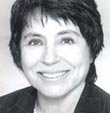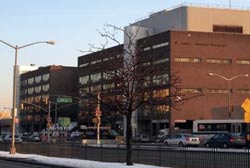
Any number of potential City Council candidates saw their plans thrown into turmoil in late 2008 when the City Council voted to extend term limits and allow incumbents, including Mayor Michael Bloomberg, to run for a third term in their respective New York City offices.

The move whittled away a number of challengers in District 25, which encompasses Jackson Heights, Corona and East Elmhurst. But two -- Daniel Dromm and Stanley Kalathara -- have remained in the primary race to challenge incumbent Helen Sears. With a spirited primary race underway, the conventional wisdom -- that an incumbent always wins -- might not hold true here. The winner of the Democratic primary will face Republican Mujib Rahman in November.
The diverse district faces an array of problems, including a lack of health facilities, development and overcrowded schools. While the candidates all seek to address those issues, their platforms emphasize different areas. Sears, who was first elected in 2001, is taking on the district's health care dilemmas; Dromm, a schoolteacher and union leader who is also a gay activist, is focusing on education reform; Kalathara, a lawyer and businessman, wants to clean up the neighborhood by improving the quality of life and attract dollars that would otherwise be spent in Manhattan.
The Hospital Closing
The fault line of this campaign is the recent closing of St. John's Hospital. When Caritas Healthcare, the company that ran St. John's Hospital and Mary Immaculate Hospital, also in Queens, filed for Chapter 11 bankruptcy early in 2009, the hospitals were unable to keep their doors open. Even before Caritas' bankruptcy, St. Johns had been plagued by a shortage of beds and outdated equipment.
Consequently, the 100,000 patients serviced in their emergency rooms must now go to other medical centers. Residents of Corona, East Elmhurst and Jackson Heights have to use the already strained resources of the two remaining neighborhood hospitals, Holliswood and Queens Hospital Center.
Sears' opponents hold her responsible for the closure of St. John's. Sears maintains that she moved quickly to keep the health center open. New York State extended money to the hospital, but said it could not make regular contributions.
"She only showed up at a protest at the very end. She should have started [taking measures to avoid this] since her election," said Dromm.
Kalathara said, "I am not going to play the blame game." But he cited his concern about the impact of any re-emergence of swine flu this fall, noting that the two remaining hospitals serving the densely packed district were already seeing a doubling in cases
Planning for the Future
Sears, a former healthcare professional, has spent a great deal of time defending her past two terms in local debates, rather than speaking of her aspirations for a third term. During her two terms, she said, the Corner Care Pavillion opened as a health center for neighborhood residents. Now she said, it will add a woman's health clinic. "This district is incredibly diverse -- every country in the world is represented here," she said. "A woman's clinic will bridge cultural differences and will provide and teach women how to seek healthcare."

Interviewed in a restaurant where the waitress speaks Spanish, Dromm cites his experience in advocacy and community affairs. "I recently organized a documentary screening about Muslim Sikhs to be shown in a Jewish center," he said.
His self-titled Dromm Plan vies to improve life for community residents with measures such as ending the self-certification practiced by real estate contractors and reducing noise pollution by pushing through legislation. He also proposes measures to help the area's many immigrants, such as addressing the employment scams which they too often face. "A center for day-laborers where they could meet potential employers would create safer situations and ensure union jobs by bringing immigrants into them," he said.
Kalathara, a self-made man who prides himself on his awareness of neighborhood difficulties, holds his interview in his neighborhood law office where the clientele are of Indian and Latino origin. He said he wants to address foreclosures, job loss and safety on Roosevelt Avenue and Junction Boulevard. "Installing lights, on stretches of blocks that often go without them is another plan to ease crime," he said.
He plans to push legislation to secure daily garbage pickup for his district and proposes the widespread use of charter schools to improve the education standards in city schools. "I will donate 10 percent of my salary to give funds to the most worthy community organization or school in this district," he said.

Kalathara extols his campaign as "a message of belief, opportunity." Holding himself up as an example of the American dream -- Kalathara worked his way up from an Indian immigrant-busboy to a lawyer -- he said, "I want to set an example for others." Indignant about the economic disparities between his district and many Manhattan neighborhoods, he said, "Queens is not a second class world. I want to make sure Queens citizens are treated first class,"
On the day of his interview, Kalathara was fighting to stay on the ballot. He sat, confident behind his desk in his Queens law office. "I've sent one of my lawyers to handle the case," he said. When questioned about the validity of the signatures on his ballot petitions, he said simply that Dromm, who had challenged them, "is a sour grape."
Votes for Immigrants
In this district of many immigrants, there is debate about Resolution 245, which would give non-citizens the right to vote in New York City elections. Dromm strongly supports the act, while Kalathara merely agreed. At a recent debate, Sears had no opinion to give, saying, "I'm here to tell you that I'm not sure where I'm on this. I haven't given it much consideration."
The passage of resolution 245 would have an enormous impact on the political landscape of New York City, particularly in this heavily immigrant Queens District. Estimates place those who are of age but cannot vote in New York City elections at 1.3 million, easily more than one-eighth of the city's overall population.
Explaining his support for the resolution, Dromm said, "There should be no taxation without representation. This is a basic American tenant, and it's the key to ones destiny."
The Anonymous Charges
On a far murkier level, controversy also has arisen over anonymous leaflets about Dromm that some have characterized as part of a "homophobic smear campaign." The leaflets reportedly allege that, as a 16-year-old, Dromm was arrested for prostitution. He has said he was simply kissing his boyfriend but that, in the 1970s, " being gay meant that you could be put away against your will in a mental institution."
Kalathra and Sears both condemned the attacks, although Sears has been criticized for not speaking out sooner and more forcefully against the advertisement.
Money and Support
Sears remains the campaign heavyweight in terms of budget. She leads with $128,493. Dromm is second in funds with $103,958 and Kalathara with $92,489.
Dromm has endorsements from the Working Families Party; Service Employees Union Local 1199, which represents healthcare workers; the United Federation of Teachers, as well as by local politicians including state Sen. Tom Duane and three City Council members from Queens.






